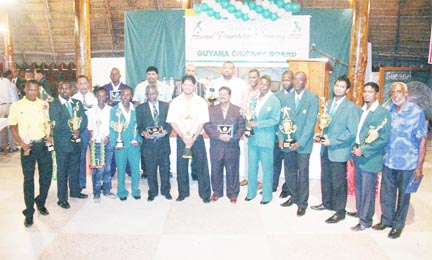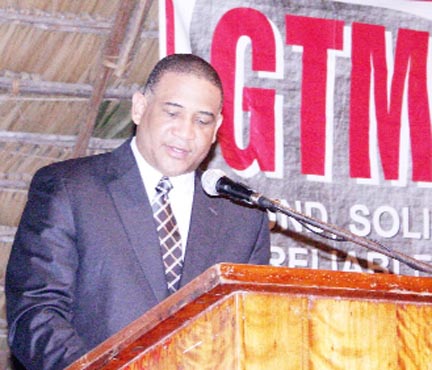West Indies Cricket Board (WICB) CEO Dr. Ernest Hilaire is urging the Guyana Cricket Board to prepare itself for a rapidly changing cricket landscape which will force it to find new ways of operating.

Dr. Hilaire was at the time delivering the feature address at the GCB annual presentation of awards ceremony at the Umana Yana on Tuesday evening.
“We have now the opportunity with the guide of the old orders of international cricket for us to study the new emerging landscape and to put in place the appropriate and relevant infrastructure to seize the moment,” he told the audience at the Umana Yana.
According to Dr. Hilaire, his organization may “have to forsake some of the old ways and while it is never easy to manage change there is no other choice but to adapt or die.”
During the feature address, Hilaire outlined four points that he believes will result in the ultimate success of West Indies cricket.

- Dr. Ernest Hilaire whilst delivering the feature address at the Guyana Cricket Board’s annual awards ceremony Tuesday night at the Umana Yana. (Orlando Charles photo)
“It is an opportune time as I have had three months in the job and I have had time to listen, learn and begin the crystallization of my thoughts of the challenges facing WI cricket”, Hiliare
explained.
The St. Lucian suggested that for WI cricket to survive and be relevant there must be;
1) A foundation that engages the social context of the cricketers;
2) An understanding of and response to change in the international cricket landscape;
3) An effort to build a resource base;
4) An undertaking to develop the WICB’s institutional capacity.
If actions on these fours points are undertaken, Dr Hilaire said that he was “highly optimistic and excited about the future of WI cricket.”
He, however, warned the gathering not to deceive itself that these initiatives will immediately correct the errors of the past stating that while the issues that confront WI cricket will be addressed, the Caribbean will not be at the pinnacle of world cricket in the next few months.
“Life is not that simple and people should not expect immediate success,” was his take on the rise of West Indies cricket back to the top.
“The reality is that the foundation for success was not in place- not that there have not been efforts in the past. There has been tremendous work done by administrators in the past. However, I believe we were too slow to put the essentials in place and unfortunately the train left the station, leaving us behind to catch up,” he posited.
He used the analogy of building where one has to first ascertain the feasibility of the terrain before designing and laying the foundation and said should the terrain be assessed then one has to determine the best position since there was no magic formula.
Meanwhile, Dr. Hilaire noted that changes around the world have had some devastating effects on the youth in the region.
He said many of today’s youths were becoming consumed with the images and lifestyles that they see on television and many have lost touch with their culture and sense of nationalism.
“We now have a generation that demonstrates little appreciation for our history and legacy and seems more motivated by money and less by intrinsic values,” Dr. Hilaire elaborated.
He pointed to a more deeply rooted problem that might be embedded in the past and made light some of his criticisms of the present generation.
“They are reflections of society; they are reflections of society’s past failures. I do not want to give the impression that all the youth are lost and not worthy of success. I am saying all of the above to illustrate the quality of social life from which our cricketers are produced and why it is imperative that the WICB join with agencies that would establish programmes that address the socio-economic situation of the youth in the region.”
He reiterated that the international cricket landscape has changed tremendously over the last few years with a distinctive shift from the primacy of cricketing considerations to commercial considerations.
He said that this shift has given rise to the influence of sponsors and broadcasters who in turn try to determine cricket matters.




